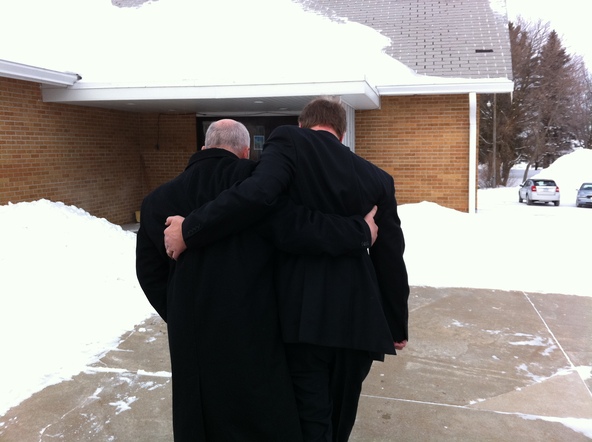I have been thinking about Oklahoma City, and have noticed how some people are responding to the pain and loss of others. I resonated most with what Rick Warren, whose own son recently committed suicide, tweeted recently:
In deep pain,people don't need logic,advice, encouragement,or even Scripture.They just need you to show up and shut up.#Love
— Rick Warren (@RickWarren) May 22, 2013
Amen.
When we encounter others who are in pain, we do not know what to do. We do not know how to comfort them. And so we say things to make a really awkward moment less awkward. When we do that, we're actually trying to comfort ourselves, which is understandable, but not helpful. These responses don't help someone who is in deep pain:
"I'm sure you'll find someone new."
"God must have needed another angel in heaven."
"At least he's no longer suffering."
"God works all things together for the good."
"Everything happens for a reason."
We don't know what to say, we don't prepare for what we're going to say, and so we end up saying something that is really only designed to help us feel less awkward.
Perhaps the most crazy story in all of the Scriptures is written about Job, the man who had it all, then lost it all. Some of his friends came over to his house, what was left of it anyway, and sat in silence for seven days.
That was very, very good.
And then they opened their mouths.
And that was very, very bad.
The first one said, "Have honest people ever been completely destroyed? You reap what you sow. What wrong have you done to cause all of this?"
And he went on and on.
Job's reply was heartbroken and simple: "A man's friends should love him when his hope is gone. They should be faithful to him even if he stops showing respect to the Mighty One."
When tragedy strikes, we don't know why. We can't know what they're going through. We haven't been there, even if we've experienced our own deep pain.
- Upon entering the house of the mourners, you don't initiate conversation; you wait for the mourners to do so.
- The mourners are not expected to greet you when you enter their house, or walk you to the door as you leave.
- The mourners are not supposed to make any food or serve any drinks; it is up to their extended family and friends to do so. This provides comfort and shows love in wordless ways.
- The mourners are not expected to go out in public for seven days; to do so would require them to put on a public face and engage in lots of painful conversation, which would be inappropriate during this time.
- The mourners wear a torn garment over their heart, to outwardly express their inner grief, without words.
- When the mourners do wish to speak, it is understood that shiva is not a time to be distracted from mourning, it's a time to name the deceased, to remember them, to share stories about them, and to say their name out loud. This is comforting.
Don't say anything to simply distract them from their pain. Silence is better than small talk. Small talk is exhausting.
Don't share a word of Scripture or advice that will attempt to wrap up the question of why it happened.
Don't tell them to "let you know if you can do anything." They're too exhausted to do that. Ask an extended family member or close friend what would be most helpful, and just do it.
Do hug them, tell them you're sorry and get them to talk about the person who has died, when they are ready to do so.
Do go visit them or call them, especially in the weeks following the funeral. It's very hard and awkward, but it helps. Many times, people get lots of love and support immediately. Perhaps you can be someone who can provide comfort when everybody else has gone back to their lives.
None of us know how to do this very well, so if you've done it poorly, welcome to humanity. But we can learn how to comfort others in ways that are actually helpful and doable, so let's do that.
